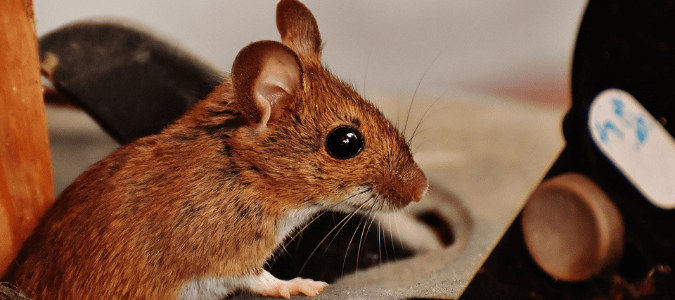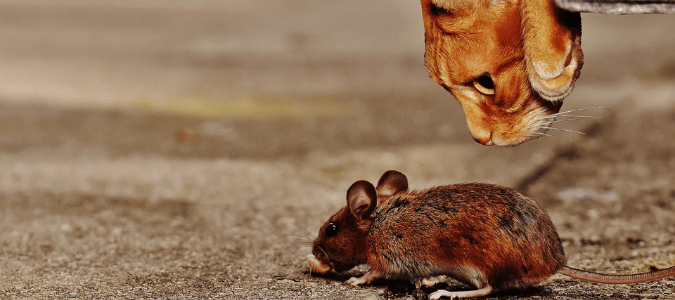How To Keep Mice Out Of Your Bed

- Seal off any holes you may have in walls. Mice can sneak through the tiniest of cracks, so don’t miss any spots.
- Stop snacking in bed. When mice come out, they are in search of food and water. Don’t let them find it in your room.
- Keep your room clear of clutter so they don’t have areas to hide or nest.
- Encourage your cat to sleep in your room. Cats give off a smell that mice register as predatory, and they will tend to avoid these pets when possible.
Even homeowners who restrict their snack habits to the kitchen know that when they spot a mouse or anything indicating mouse activity in the home, it’s time to get educated about these pests, including what attracts mice and rats to your home, what health risks these rodents pose to your family and what to do if you think you may have a mouse infestation on your hands. First, let’s address one of the most common questions homeowners ask—can mice climb up walls?

Can Mice Climb Walls And Ceilings?
After finding evidence of mouse activity in high-up locations in their homes, many homeowners ask, “Can mice climb walls and ceilings?” While mice can’t defy gravity by crawling across the ceiling, like roaches can, evidence of mice in high-up places is proof that mice can, indeed, climb walls, at least to an extent. They can jump surprisingly far distances, and these rodents can climb walls that are textured or angled. They can also climb ropes and curtains with relative ease, which can be another way they can reach those high-up areas in your home.
Thus, a homeowner might have discovered mouse droppings on top of a cabinet, for example, or a mouse hole that is near the ceiling rather than at floor level. They might also find discolored, greasy tracks along the top of a wall that are the result of rodents traveling along crown molding, cabinetry or rafters, and rubbing their bodies against the wall as they go.
Another common question homeowners ask, many times in frustration, is why mice and rats chose to live in their home as opposed to someone else’s.

What Attracts Mice And Rats To Your Home?
Many people who find evidence of rodents living or breeding in their homes, attics or garages wonder what attracts mice and rats to their living space and how to keep them away.
Some key reasons why rodents might enter your home include:
- You haven’t tidied up in awhile. Mice are attracted to areas where people have left food out on counters or stovetops, neglected to clean up crumbs and allowed garbage cans to overflow. Mice aren’t picky eaters and are happy to eat anything you leave out.
- There is water. Just as with food, mice need easy access to water in order to survive. Anyplace in your home where water accumulates, such as from leaky pipes or in pets’ water bowls, can attract mice and other pests in search of water.
- It’s more comfortable than outside. Along with food and water, mice also need warm, comfortable shelter to build their nests, breed and thrive. Any cracks or holes in the exterior of your home are potential points of entry that could allow mice to get into your walls and, from there, into the interior of your living space. Mice are adept at squeezing through surprisingly tiny spaces. As a matter of fact, a full-grown mouse can fit through an opening as small as a dime.
While some people consider mice to be relatively harmless or even cute, these uninvited guests actually pose a real threat to our loved ones, including our pets. Mice are known to carry diseases such as salmonella and hantavirus that can potentially be serious for humans. Furthermore, the fleas and ticks that live on mice can transmit illnesses to humans such as Lyme disease. And, as tiny as they might be, mice can cause big problems when they infest a home. Like other rodents, mice must gnaw frequently to keep their continuously growing front teeth filed down, so they can cause extensive damage when they chew through drywall, PVC pipes or even electrical wiring. Their urine and feces can also contain harmful bacteria and viruses that might make people and pets ill. If not cleaned properly, these substances soak through floors and ceilings, resulting in property damage that is costly to remedy.
With the diseases that rodents can carry, you may be wondering what would happen if your cat ate one of these creatures.

My Cat Ate A Mouse—Should I Be Worried?
While cats have a natural predatory instinct that has led to centuries of being used as natural pest control in people’s homes and barns, there is a downside to this practice: cats can actually contract diseases from the mice and rats they catch and eat. Hantavirus and toxoplasmosis are just two diseases mice can carry that can affect the cats that eat them. Cats can also catch fleas and ticks from the mice they hunt, and can then bring those pests, and the diseases they carry, to the humans they live with.
That being said, hunting small animals is an inborn instinct for cats. Since many people use rat poison for rodent control, and poison can take time before it takes effect, it’s possible that a cat could catch and eat a poisoned mouse and become ill from the toxic chemicals—even if you did not use these substances on your property, but the creature ingested the poison in a neighbor’s yard. Thus, if your cat has caught and eaten a mouse, and especially if your cat seems sick or isn’t behaving normally, it’s a smart idea to check in with your veterinarian to see if your pet needs a checkup.
If you don’t want to risk your cat catching fleas, ticks or diseases from a mouse, you can try putting a bell on your cat’s collar and asking your veterinarian about effective flea and tick repellents that are recommended for cats to use. Of course, the best way to prevent your cat or any member of your family from catching diseases from a mouse or rat is to get rid of the creatures themselves.

Home Remedies To Get Rid Of Mice And Rats: Do They Work?
When you’re seeking out home remedies or other green tips to get rid of mice and rats, there’s an important question to consider first before you try any natural DIY methods: Do they actually work as intended?
Unfortunately, effective home remedies for killing mice and rats that are also low-impact for people, pets and the environment are not as common as we might hope.
One problem is that many DIY home remedies and methods of pest control with baby safety in mind are not backed by scientific studies, so reports of home pest control remedies that really work are generally anecdotal at best. Another problem is that just because a home remedy is natural doesn’t mean it may not pose health risks. For example, some people claim clove and peppermint oils are good rodent deterrents, but both can be poisonous for dogs and cats if consumed, and even their strong fumes can be too much for some people and pets to handle. Similarly, some people recommend a mixture of plaster of Paris with cornmeal, flour and milk to form a dough that will entice mice and rats and then kill them once consumed, but this mixture can also be dangerous for other animals and even children to consume.
Fortunately, there are plenty of low-impact steps homeowners can take to keep mice and other pests away that are humane for the rodents, as well as friendly for people, pets and the environment. Keep in mind that the following suggestions work best as preventative methods, which means they may not be effective in getting rid of rodents if you already have an infestation in your home or on your property. In that case, it’s best to contact a reputable rodent control expert with a track record of success in getting rid of these fast-breeding and highly adaptable pests.
Here are some earth-friendly ways to make your home more rodent-proof and less appealing to mice and rats:
- Keep your kitchen and dining areas clean and free of food spills and crumbs.
- Keep both indoor and outdoor trash cans clean, closed and properly stored.
- Store all food, including pet food, in tightly sealed containers that rodents can’t access.
- Empty your pets’ water bowls at night and refill them in the morning with fresh water.
- Fix any leaking pipes, drainage issues or other areas where water accumulates either inside or outside the home.
- Seal off any holes, gaps, cracks or other potential entry points to your home or garage, in order to prevent mice and other unwanted animals or insects from entering. Pay special attention to the areas around eaves, window and door frames, outdoor faucets and vents from the stove, bathroom or dryer, as these are common areas for gaps or cracks to develop.
When you call in a professional, you can benefit from additional tips that are specific to your home to help prevent these pests from invading again.
Chem-Free Can Handle Your Rodent Problems
Homeowners looking for a natural, holistic and humane approach to rodent control can count on Chem-Free for an effective solution. Our licensed and experienced pest control specialists can handle any rodent or pest problem, no matter how extensive or complicated it might be. Best of all, when you work with Chem-Free, you know you’re in good hands, because we carefully consider the impact on the environment, along with that of every person and pet living in your home, in every pest control product and method we use.
Need Help Managing Pests?
Chem-Free offers both effective, low-impact pest control options and preventative measures to help avoid future infestations. Contact us today for a free estimate!


